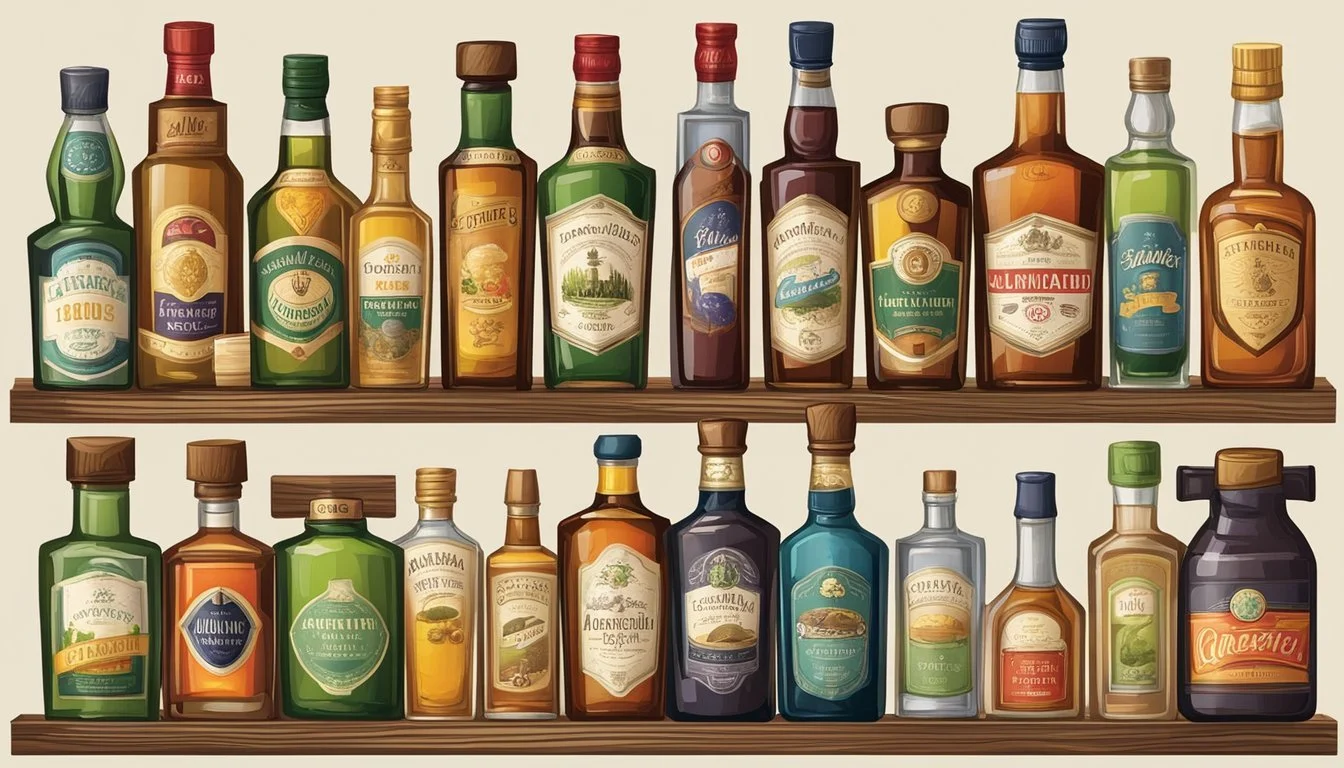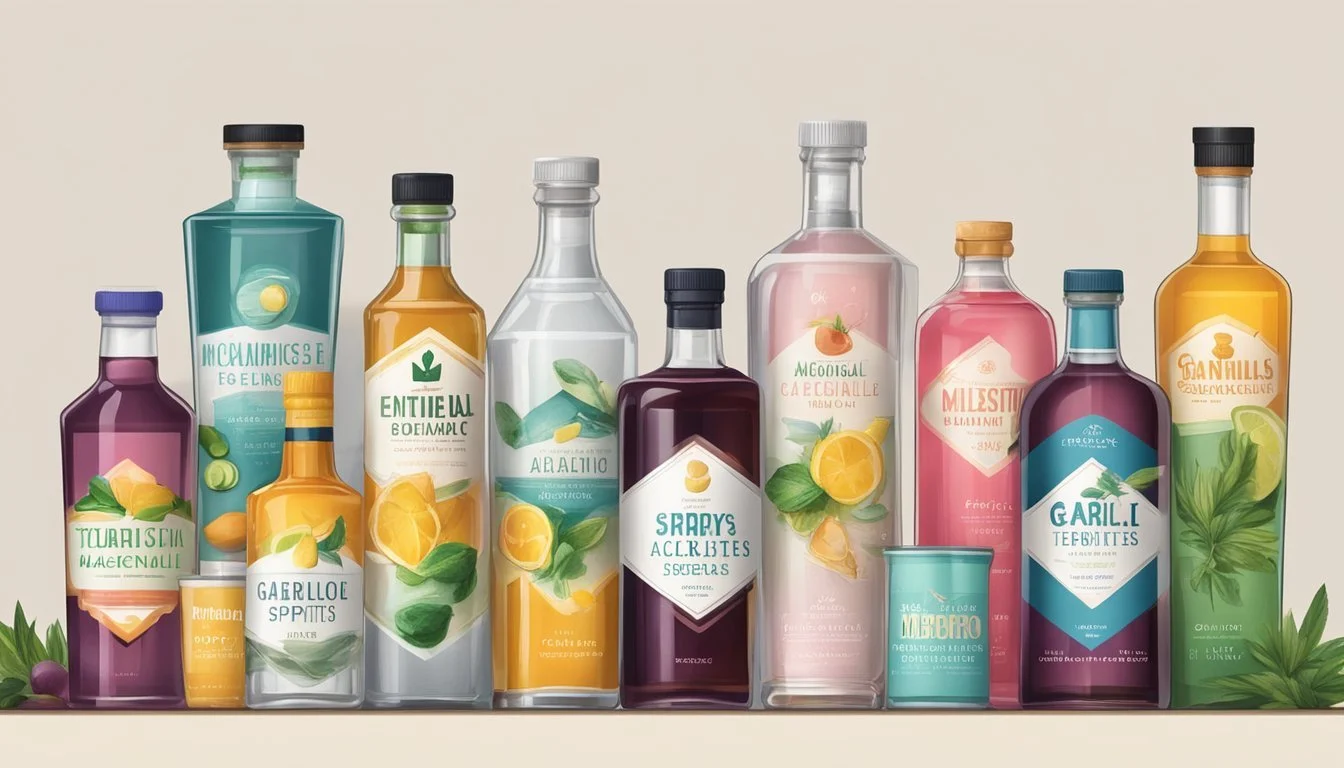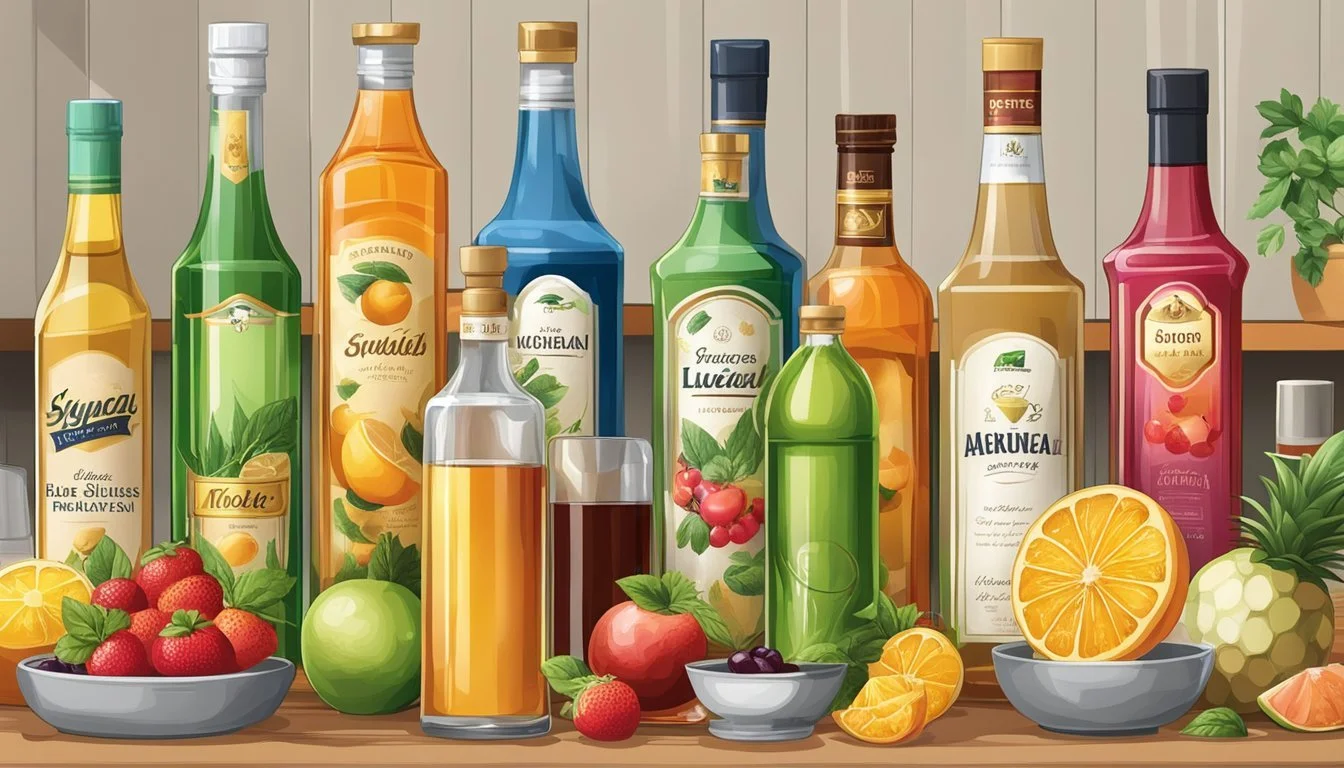Alcohol/Liquor Substitutes
A Guide to Non-Alcoholic Alternatives
The increasing demand for healthier lifestyles and accommodating various dietary restrictions has led to the rise of alcohol-free and zero-proof beverage options. These substitutes cater to individuals looking to reduce their alcohol consumption while still partaking in the social and culinary experiences that traditional alcoholic beverages offer. The market is now replete with a variety of non-alcoholic spirits that mimic the complexity and flavor profiles of their alcoholic counterparts. The development of these products reflects a broader trend towards mindful consumption, allowing consumers to enjoy a sophisticated drinking experience without the effects of alcohol.
Advancements in the beverage industry have facilitated the creation of zero-proof spirits that mirror the taste and mouthfeel of liquors such as gin, bourbon, and rum. These alternatives often employ botanical extracts and spices to replicate the distinct nuances of alcoholic spirits. Moreover, the availability of such options enables individuals to craft mocktails that are as intricate and flavorful as traditional cocktails. This inclusivity allows those abstaining from alcohol, whether for health, personal, or religious reasons, to feel integrated in social settings where drinking is prevalent.
With this evolution, bartenders and mixologists are now equipped to offer a wider selection of beverages to patrons, ensuring no guest is left without a fitting drink in hand. It’s not just about removing alcohol from the equation; it’s about ensuring the depth of flavor remains undisturbed. This growing segment of the beverage industry shows a commitment to quality and diversity, ensuring alcohol-free and zero-proof drinks are not mere afterthoughts but are celebrated as integral offerings within the realm of gastronomy and hospitality.
Understanding Alcohol Substitutes
Incorporating alcohol substitutes into recipes and drinks allows for greater inclusivity and health considerations while maintaining desired flavors.
Health and Safety Considerations
For individuals abstaining from alcohol for health or personal reasons, zero-proof or alcohol-free alternatives provide a safe choice. Low-alcohol and non-alcoholic substitutes such as non-alcoholic spirits, beers, and wines offer a similar taste experience without the health risks associated with alcohol consumption. They are especially popular during initiatives like Dry January.
Zero-proof drinks: Completely devoid of alcohol, ideal for health-conscious consumers.
Alcohol-free options: Typically contain a minute amount of alcohol but marketed as non-alcoholic.
Historical and Cultural Context
Alcohol substitutes have roots in cultural practices where alcohol is prohibited or discouraged. Non-alcoholic gins or tequilas may be used in social settings to respect these traditions. Additionally, the rise of non-alcoholic bottle shops indicates a shift towards inclusive hospitality, offering good drinks without alcohol.
Cultural substitutes: Non-alcoholic bourbon or rum can preserve the essence of traditional beverages.
Historical use: Vermouth or brandy alternatives honor historical drinks while staying alcohol-free.
Categories of Alcohol Substitutes
Alcohol substitutes can be categorized based on the type of alcoholic drink they aim to replace. There are non-alcoholic versions of liquors such as gin, bourbon, and tequila, as well as alternatives for champagne and vermouth. While Campari may be harder to replicate, amiable non-alcoholic substitutes exist.
Non-alcoholic liquors: Substitutes for gin, whiskey, and rum, crafted to mimic the original flavor profiles.
Non-alcoholic wines and beers: Offered in various styles, including sparkling options like champagne.
Specialty substitutes: Non-alcoholic vermouth and Campari-style products are available for those seeking complex, botanical-infused drinks.
Non-Alcoholic Spirits
Non-alcoholic spirits offer the complexity and taste of traditional spirits without the alcohol. These alternatives are skillfully crafted to cater to adults looking for sophisticated, non-alcoholic beverages.
Distillation and Production
Non-alcoholic spirits undergo a process similar to traditional distillation, but with the final goal of removing or never incorporating alcohol. Brands use a variety of techniques including steam distillation and vacuum distillation to extract flavors from botanicals, such as juniper, ginger, and citrus. The emphasis is on preserving the essence and nuance of these ingredients, without relying on alcohol as a carrier.
Popular Brands
Among the pioneers and leading figures in the non-alcoholic spirits market are:
Seedlip: Offering varieties like Garden 108, Grove 42, and Spice 94.
Spiritless: Known for Spiritless Kentucky 74, a bourbon alternative.
Lyre's: They offer a wide range, including a non-alcoholic Italian Orange spirit.
Ritual: Ritual Zero Proof presents alternatives such as a non-alcoholic tequila.
Others in the field include Arkay, Aplós Calme, Kin Euphorics, and Three Spirit, each creating their own unique expressions and flavors.
Tasting Notes and Flavor Profiles
Non-alcoholic spirits aim to mimic their alcoholic counterparts while offering distinct and complex flavor profiles.
Seedlip Garden 108: Features herbal notes with pea and hay, reminiscent of an English Garden.
Seedlip Grove 42: Showcases a zesty and citrus-forward taste.
Seedlip Spice 94: Characterized by warm spice notes, cascarilla bark, and citrus peel.
Spiritless Kentucky 74: Offers the woody and smoky flavors typical of bourbon, without the alcohol.
Ritual Zero Proof Tequila Alternative: Captures the essence of agave, with a hint of habanero for spice.
Lyre's Italian Orange: A non-alcoholic aperitif with rich orange flavor and a slightly bitter finish.
Many non-alcoholic spirits emphasize being plant-based, catering to a more health-conscious audience. They may also include unconventional botanicals, such as sage or lapsang souchong, to broaden their appeal and introduce new flavor experiences.
Mocktails and Non-Alcoholic Cocktails
Exploring mocktails and non-alcoholic cocktails opens up a world of creativity and inclusivity in the realm of delicious beverages. With a focus on innovative substitutes and balancing flavors, this section delves into crafting delightful zero-proof drinks that cater to all palates and occasions.
Crafting the Perfect Mocktail
Crafting the perfect mocktail requires attention to flavor balance, texture, and presentation. Ingredients like shrub syrups—acidic mixtures made of fruit, sugar, and vinegar—can add depth. Devices such as carbonators can introduce fizz to replicate the effervescence of alcoholic drinks. For a classic Virgin Margarita or Paloma, using fresh citrus juices and zest can imitate the sharpness typically delivered by tequila.
Mocktail Recipes
Spicy Pineapple Mocktail: Combine fresh pineapple juice, a squeeze of lime, and a pinch of chili for a tropical drink with a kick.
Virgin Espresso Martini: Mix cold brew coffee, a dash of coffee liqueur alternative, and simple syrup for a non-alcoholic take on this caffeinated cocktail.
Non-Alcoholic Alternatives for Classic Cocktails
To replace gin, brands like Seedlip and Monday Zero Alcohol Gin offer complex flavors reminiscent of London Dry Gin. Wilderton Bittersweet Aperitivo is a popular choice for creating a booze-free Negroni. For an alcohol-free champagne experience, sparkling apple cider or non-alcoholic sparkling wines are excellent choices.
Ingredients and Additives
Here is a concise list of ingredients and additives often used in mocktails:
Flavoring agents: Seedlip, Ghia, Ritual
Sweeteners: Sugar cane syrup, allspice syrup
Acidifiers: Lemon juice, shrubs
Texture enhancers: Egg whites (for froth), cream (for richness)
Bitters: Non-alcoholic bitters to add layers of flavor
Non-Alcoholic Brands and Mixes
Several brands have specialized in high-quality non-alcoholic alternatives that don't compromise on taste. These include:
Monday Gin: An alcohol-free spirit that retains the botanical profile of traditional gin.
Curious Elixirs: Crafted beverages like Curious Elixir No. 2, which are complex and ready-to-drink mocktails.
Pentire Adrift: A botanical non-alcoholic spirit inspired by the flavors of the sea.
Substitutes for Specific Alcoholic Beverages
Choosing non-alcoholic alternatives can be straightforward with the right knowledge of substitutes that mimic the flavors and experiences of their alcoholic counterparts. The key is to identify non-alcoholic beverages that offer similar body, complexity, and mouthfeel.
Beer Alternatives
For those seeking a non-alcoholic version of beer, there are various non-alcoholic beers on the market. These beverages maintain the traditional beer flavor profiles with added benefits such as fewer calories and no alcohol content. Another option is to look for drinks that emulate the refreshing carbonation of beer, like sparkling water with flavorings, providing a bubbly experience without the alcohol.
Wine Substitutes
When replacing wine, whether in cooking or as a beverage, there are several suitable substitutes. Nonalcoholic wine provides a similar taste without the alcohol content. For those looking to replicate the essence of wines in recipes or drinks:
Red Wine can be substituted with beef broth, red grape juice, or unsweetened cranberry juice.
White grape juice can be a stand-in for white wine, offering a similar sweetness and acidity.
Spirits and Liquor Replacements
The complexity of spirits like vodka, scotch, gin, bourbon, tequila, whiskey, and rum can be mimicked with creative replacements:
Vodka can be replaced with clear liquids or even plain water in mixed drinks to maintain the drink's structure without the alcohol.
For a non-alcoholic bourbon alternative, one might use a combination of non-alcoholic vanilla extract and water.
Alcohol-free gins and gin alternatives, such as Monday Zero Alcohol Gin and New London Light, provide the botanical flavors without the alcohol.
A non-alcoholic tequila alternative can supply the distinct tequila flavor for mocktails.
Rum flavor can often be approximated with a mixture of water, a touch of almond extract, and other fruit juices such as pineapple or apple juice.
By carefully selecting these alternatives, it's possible to enjoy a wide range of beverage experiences in a non-alcoholic format.
Culinary Applications
When integrating alcohol substitutes into cooking and baking, one seeks to maintain the dish's sophisticated layers of flavor while excluding the alcohol content. The two primary areas to address are how substitutes can effectively mimic the properties of alcohol in various recipes and the palette of non-alcoholic ingredients available to a cook or baker.
Cooking and Baking with Alcohol Substitutes
When alcohol such as wine is used in cooking, it's often to advantage depth, acidity, or to tenderize in the case of marinades. Cooking with wine also helps to release fat-soluble flavor compounds in certain ingredients, enhancing the overall taste of the dish. In sauces, for example, the reduction of wine concentrates its flavors, which can be replicated with substitutes like:
Red Wine: Beef or vegetable broth combined with a splash of red grape juice or vinegar (to balance sweetness).
White Wine: Use white grape juice with a few drops of vinegar or lemon juice to compensate for the acidity.
For desserts, where the unique flavors of alcohol such as rum or sherry are desired, non-alcoholic extracts can step in without introducing additional liquid that could throw off recipe ratios.
Rum in Desserts: Replace with a mix of white grape juice and a few drops of almond extract.
Sherry in Desserts: Opt for a mix of vanilla extract and orange juice.
Flavoring with Non-Alcoholic Ingredients
In recipes calling for the distinct flavors of citrus, juniper, botanicals, or rose, there are bountiful alternatives that offer a similar profile without the alcohol:
Citrus: Employ the zest and juice of oranges, lemons, and limes for a fresh, tangy note.
Alcohol Non-Alcoholic Substitute Citrus Equal parts lemon juice or lime juice Juniper A small amount of crushed juniper berries
Botanicals and Rose: Floral waters, such as rose water, add a botanical touch, emulating floral liqueurs.
Agave can be used as a sweetener, particularly in recipes that call for a touch of tequila.
Ginger and Habanero: To enhance the spice without ingredients like ginger liqueur, chefs might use fresh ginger or habanero peppers, finely minced or infused into syrups.
Sage: Fresh or dried, sage brings an earthy element to dishes that might otherwise use a sage-infused spirit.
In creating a non-alcoholic version of a bittersweet aperitivo, one might blend ginger ale with a careful selection of herbs and spices to simulate the bitter complexity.
It's always important to balance the substitutes to reflect the original's essence without overpowering the dish. Taste modifications may be necessary, considering that each product can vary in sweetness, acidity, and intensity. Through careful substitution, one can achieve delightful culinary results that honor the original spirit of the recipe.




